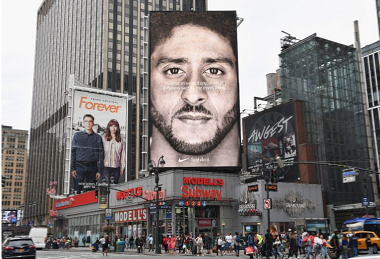- A number of companies have been linked to labor forced on Uighur Muslims by the Chinese government, according to multiple reports.
- The Washington Post found that Apple supplier Lens Technology uses Uighur workers in its factories, according to documents obtained by the Tech Transparency Project.
- Abercrombie & Fitch, Adidas, Gap, Calvin Klein, H&M, L.L.Bean, Lacoste, Nike, and many other brands are "potentially directly or indirectly benefiting from the use of Uyghur workers outside Xinjiang through abusive labour transfer programs as recently as 2019," according to a report from the Australian Strategic Policy Institute.
A Nike Ad featuring American football quarterback Colin Kaepernick
is on diplay September 8, 2018 in New York City.
(Photo credit ANGELA WEISS/AFP/Getty Images)
A number of companies and brands have been linked to labor forced on Uighur Muslims by the Chinese government, according to multiple reports.
The Washington Post reported Tuesday that Apple supplier Lens Technology uses Uighur workers in its factories, according to documents obtained by the Tech Transparency Project. These workers were transferred from labor camps in the Xinjiang region of western China, WaPo reported. (RELATED: Pompeo Demands China End 'Horrific' And 'Dehumanizing' Forced Abortions, Sterilizations Of Uighurs)
Apple, which has said that it is committed to donating to organizations that "challenge racial injustice and mass incarceration," is not the only company to come under scrutiny for its links to slave labor. In a spring 2020 report titled "Uyghurs For Sale," the Australian Strategic Policy Institute found that at least 83 popular, household-name brands are "potentially directly or indirectly benefiting from the use of Uyghur workers outside Xinjiang through abusive labour transfer programs as recently as 2019."
The report listed popular clothing companies Abercrombie & Fitch, Adidas, Gap, Calvin Klein, H&M, L.L.Bean, Lacoste, Nike, The North Face, Polo Ralph Lauren, Puma, Skechers, Tommy Hilfiger, Zara, and Victorias Secret, as well as General Motors, Goertek, Land Rover, Mercedes-Benz, Volkswagon, and more. Many of these companies prolifically spoke out against racial injustice following the death of George Floyd in May. (RELATED: DHS Blocks Cotton Imports From Chinese Slave Labor Camps From Entering US)
"This report estimates that more than 80,000 Uyghurs were transferred out of Xinjiang to work in factories across China between 2017 and 2019, and some of them were sent directly from detention camps," a summary of the report said. "The estimated figure is conservative and the actual figure is likely to be far higher."
"In factories far away from home, they typically live in segregated dormitories, undergo organised Mandarin and ideological training outside working hours, are subject to constant surveillance, and are forbidden from participating in religious observances," the report summary continued. "Numerous sources, including government documents, show that transferred workers are assigned minders and have limited freedom of movement."
Several major companies have reportedly fought efforts to end the practice of forced labor - specifically the Uyghur Forced Labor Prevention Act, which passed the House by a vote of 403-6 in September.
Coca-Cola, Nike, Apple, and other corporations fought to weaken the bill's language, the New York Times reported in late November, arguing that the bill would harm the supply chains they rely on in China. (RELATED:Report: Apple Supplier Allegedly Uses Forced Chinese Labor To Produce iPhone Screens)
Coca-Cola and Nike both pushed back on the NYT report in statements to the Daily Caller, arguing that they did not lobby against the Uyghur Forced Labor Protection Act or source products from Xinjiang.
Apple, which has said that it is is committed to donating to organizations that "challenge racial injustice and mass incarceration," has protested that it rigorously audits companies in its supply chain to make sure that Apple's products aren't derived from forced labor, saying in a statement to WaPo that "Apple has zero tolerance for forced labor."
"Looking for the presence of forced labor is part of every supplier assessment we conduct, including surprise audits," spokesman Josh Rosenstock told Apple.
"Any violation of our policies has immediate consequences, including possible business termination. As always, our focus is on making sure everyone is treated with dignity and respect, and we will continue doing all we can to protect workers in our supply chain," Rosenstock added.




